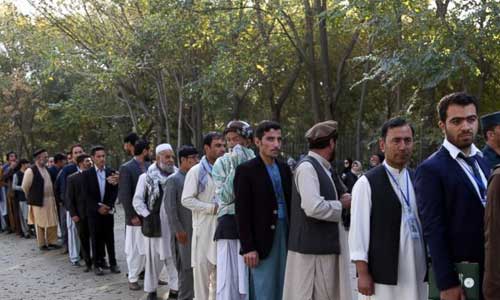According to Gallup, a US polling organization, people in Afghanistan are showing unprecedented levels of pessimism about the future of the war-ravaged country. The survey sought the opinions of Afghan Adults on quality of life, satisfaction with leaders, and views toward other countries through conducting interviews from 2,000 Afghans. The survey has found that two-thirds of Afghans say things in their life are worse now than 12 months ago and almost half say they expect things that will be worse a year from now. The survey also found that over two thirds (69 percent) of Afghan adults say that things in their life today overall are worse than they were 12 months ago, just over a quarter (26 percent) say things are the same, and fewer than one of 20 (4 percent) say they are better. According to Gallup, this is the lowest figures it has recorded from different countries since the polling organization began such global studies in 2006.
Afghans in cities were, however, found to be more dissatisfied than those in rural areas (51 percent vs. 39 percent) to say that things in their lives are much worse than they were a year ago. The survey shows that people almost half (46 percent) of adults expect their lives are getting worse, one in five (22 percent) say things will be about the same, and just 2 percent say they expect things to be better a year from now. Three in ten (30 percent) say they don’t know how things in their lives will be 12 months ahead. However, more than three-quarters of Afghans are dissatisfied with their national leaders.
In a statement issued by the organization, it stated that three-fourths or more of Afghan adults express their dissatisfaction with the performance of their country’s leadership. 81 percent say they are dissatisfied with the performance of the National Unity Government; 76 percent say they are dissatisfied with President Ashraf Ghani and 86 percent say they are dissatisfied with CEO Abdullah Abdullah. Overall, the figures in the annual study mark a sharp deterioration comparing to previous years.
Regarding regional and international powers, survey indicate that regional powers are seen most favorably, western powers less so, Pakistan and insurgent groups are seen most unfavorably. Asked about their opinions of ten selected countries and organizations, Afghans expressed their most favorable opinions of India 62 percent overall in favor of, followed by China at 46 percent, Russia at 39 percent and Iran at 37 percent. Meanwhile, major western actors in Afghanistan draw favorable opinions from about a third of Afghans: both Great Britain and the United States at 34 percent favorable overall, the U.S. with 11 percent and the U.K. with 10 percent “very” favorable. NATO/ISAF is seen favorably by just under three in ten (28 percent overall, 6 percent “very” favorable).
Almost half (46 percent) of Afghans with post-secondary education express a favorable view of the U.S, compared to 38 percent of those with up to a secondary education, and 28 percent of Afghan adults with no formal education. Two in three Pashto speakers (67 percent) say they have an unfavorable view of the U.S, compared to 44 percent of Dari speakers and 32 percent of Uzbek speakers who express an unfavorable view of the United States.
The survey results were announced in the wake of parliamentary elections, which were held with its ups and downs. The common points regarding public pessimism was also felt in the people’s participation in the overall election process. For example, out of nearly 13 million eligible Afghan only nine million registered to vote but eventually nearly four million cast their ballots during the two-day elections. However, the election was described as a widely participated election. People were praised national and also international allies for accepting the risk of threats in the two or three day election. And more than half a million Afghans risked their lives to vote in legislative elections in southern Afghanistan yesterday, after the Taliban-claimed killing of a powerful police chief delayed the ballot by a week.
In fact, the latest survey “reveals just how devastating the negative cycle of poverty and violence has been to Afghans´ daily experiences,” Gallup said. The outcome of the survey is also similar to a recent UN figures released about poverty and war crisis; regarding poverty, UN called has called the international community for urgent financial assistance for nearly 5.5 million hungry people in Afghanistan. Regarding war causalities, they reported nearly 40 thousand causalities within few last years while droughts has effected at least 22 of 34 provinces. Thus, UNICEF had informed from the bad condition of 7000 Afghan children reached Greece as a result of ongoing crisis in the current year. The Afghan officials also confess the issue but they blame the ongoing war and droughts as the main factors for the crisis.
Therefore, the long-term war and poverty are the main factors for pessimism of people while it has caused many disastrous consequences such as spread of armed violence, huge increase in addiction, domestic migration, increasing the population of cities, brain drains and the vacancy of the countryside. More importantly, the increasing unemployment fuels war in the country as the terrorist groups can easily hire unemployed teens to use as suicide attackers, battle forces, or laborers for implanting Improvised Explosive Devices (IED) and in some provinces unemployment has also led people to cultivate opium or poppy.
Home » Opinion » US Survey Reveals Unprecedented Pessimism in Afghanistan
US Survey Reveals Unprecedented Pessimism in Afghanistan
| Mohammad Zahir Akbari

